Menu
Menu

As an organisation that works to builds good relations between people of different faiths and beliefs, we need to understand and respond to the societal context we work in. Below are some of the reports and papers we have commissioned or written to explore, clarify and better understand different elements of the context in which our work takes place.
Promoting the Exploration of Religion and Worldviews in Schools – Fostering Coherency and Diversity
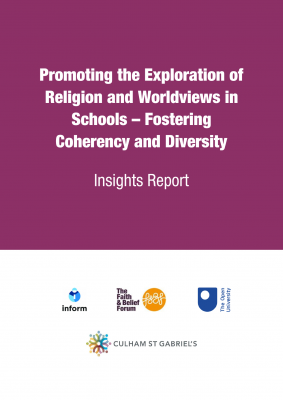 Sarah Harvey and Suzanne Newcombe – Inform
Sarah Harvey and Suzanne Newcombe – Inform
Carrie Alderton, Amy Ark, Phil Champain and Anna Lockley-Scott – Faith & Belief Forum
This Insights Report summarises and analyses the data from a series of focus groups held online between July and November 2021, as well as two surveys open in this same time period. This report summarises our participants views; terms in quotation marks are direct quotes from participants.
The data was collected as part of the project Promoting the Exploration of Religion and Worldviews in Schools – Fostering Coherency and Diversity. This is a project undertaken by The Faith & Belief Forum, The Open University and Inform, with funding from Culham St Gabriel’s.
The project aims to educate people outside the classroom about the importance of teaching Religion and Worldviews inside the classroom.
Download the full reportBuilding Closer Communities: An evaluation report
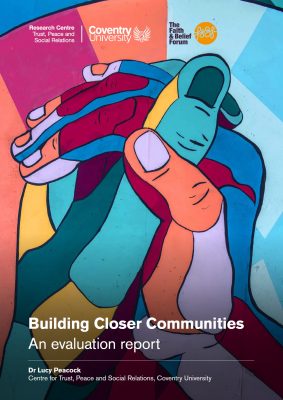 This external evaluation was led by Dr Lucy Peacock from The Centre for Trust, Peace and Social Relations, Coventry university.
This external evaluation was led by Dr Lucy Peacock from The Centre for Trust, Peace and Social Relations, Coventry university.
This report details the design and delivery of the Building Closer Communities programme evaluation. Building Closer Communities was a Ministry for Housing, Communities and Local Government funded programme delivered between November 2020 and March 2021 by interfaith charity The Faith & Belief Forum, in partnership with youth interfaith charity The Feast.
The programme was designed to ‘promote shared values among people of all backgrounds through sustainable social integration and meaningful civic participation’ in the two ‘target areas’ of Birmingham and the London Borough of Barking and Dagenham.
The report shows that the programme was largely very successful in meeting this aim and a subsequent, longer programme is recommended.
Download the full reportTogether, We Can Achieve Unity
Shared Learning Paper from the Ministry of Housing, Communities and Local Government’s Race, Faith and Hate Crime Programme 2020-2021.
This paper explores the shared learning and best practice examples from the Faith & Belief Forum and seven other organisations that delivered projects focused on increasing social cohesion during the pandemic.
They were funded under the Ministry of Housing, Communities and Local Government’s (MHCLG) Race, Faith and Hate Crime Programme 2020- 21. All organisations were highly successful in their collective numerical and geographical reach, and in their impact.
As part of the programme, the Faith & Belief Forum ran the Building Closer Communities project, which enabled residents in two regions – Birmingham, and Barking & Dagenham in London – to meet, share, and explore issues related to faith, belief, and culture.
Download the full reportContact in the Classroom
This evaluation report is based upon doctoral research conducted by Lucy Peacock from the Centre for Trust, Peace and Social Relations, Coventry University. Lucy researched the impact of the Faith & Belief Forum’s School Linking programme between 2016-2020 in order to better understand the ways in which the programme fosters peaceful relations between young people in schools.
The PhD combined interdisciplinary research in education, the sociology of religion and social psychology with impact evaluation to provide an original account of the role and effectiveness of School Linking. The research draws upon analysis of almost 1,500 student and teacher surveys designed by F&BF in 2016-17, as well as data collected by Lucy in 2017-18 through online surveys, teacher focus groups and participant observation of teacher training and school activities.
The report summarises Lucy’s research findings and their implications for our understanding of School Linking’s theoretical underpinnings (contact theory). It closes by detailing how the research has influenced the design, delivery and evaluation of School Linking moving forward.
Download the full reportCohesive Societies: Faith and Belief
This report was commissioned by the Faith & Belief Forum and the British Academy and makes a contribution to the Academy’s Cohesive Societies programme. This programme asks how societies sustain cohesiveness in the face of rapid political, social, economic and technological change.
The report, written by Dr Madeleine Pennington at the think tank Theos, explores the different ways in which faith and belief interacts with societal cohesion. It has a particular emphasis on how faith organisations interact with communities.
Part one of the review considers how cohesion policy has accounted for the faith and belief sector over time. Part two considers the practical impact of the faith and belief sector on our communities.
Read the press release about the report
Listen to the podcast about the report
Download the full reportWorking Together in Barking and Dagenham
Working Together in Barking and Dagenham is a two-part document which has been collaboratively created by the Faith & Belief Forum, London Borough of Barking and Dagenham, and Barking and Dagenham Faith Forum. Together the three parties undertook extensive engagement with stakeholders in the local community and facilitated the creation of a shared action plan.
The vision of this document is a better connected, faith friendly borough, where people of all backgrounds feel safe, celebrated, and included and the invaluable contribution faith communities make to the borough is realised and amplified, faith-based needs are understood and met, and where faith-based organisations, including B&D Faith Forum, are leading voices with platforms to represent their communities.
This document recognises the role that all organisations and residents in Barking and Dagenham have in realising this vision.
Download Part 1 Download Part 2Media, Faith and Belonging
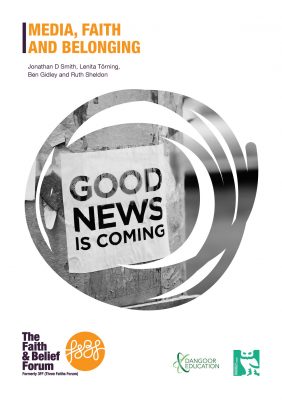 This report by the Faith & Belief Forum and the Department of Psychosocial Studies at Birkbeck calls on media organisations to provide more opportunities for religious groups to represent themselves.
This report by the Faith & Belief Forum and the Department of Psychosocial Studies at Birkbeck calls on media organisations to provide more opportunities for religious groups to represent themselves.
The report finds that inaccurate, sensationalised and simplistic media coverage reinforces negative stereotypes of religious groups, increasing the potential for suspicion, fear and communal violence. The report highlights how journalists, academics, community organisations and religious groups are working to address the issues in three ways: by challenging inaccurate stories, telling their own stories and working together to make a shared story.
It is the third and final in a series of reports supported by a grant from Dangoor Education which look at different aspects of belief and belonging in London.
Press release about the report is available here
Audio recording from the roundtable event available here
Download the full paperHate Crime, Faith and Belonging
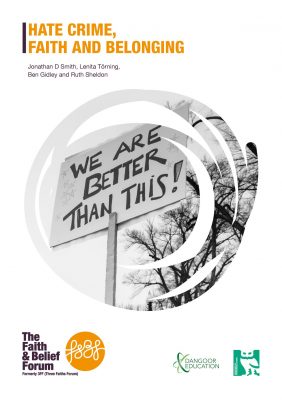 This report by the Faith & Belief Forum and the Department of Psychosocial Studies at Birkbeck explores the issue of religious hate crime, and provides recommendations for organisations working to address the issue.
This report by the Faith & Belief Forum and the Department of Psychosocial Studies at Birkbeck explores the issue of religious hate crime, and provides recommendations for organisations working to address the issue.
It draws on insights from a May 2018 roundtable at Birkbeck which brought together 23 local organisations, academics and policy experts to explore the issues and share good practice. The report recommends that responses to hate crime should be led by local communities and seek to challenge divisive narratives with messages of belonging. Responses to should be collaborative, bringing together faith groups, faith forums, community organisations and local government.
It is the second of a series of three reports supported by a grant from Dangoor Education which look at different aspects of belief and belonging in London.
Press release about the report is available here
Audio recording from the roundtable event available here
Download the full paperFaith, Belief and Inclusion
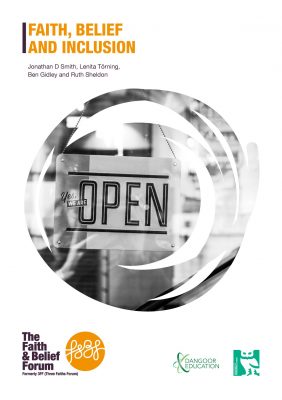 This briefing paper by the Faith & Belief Forum and the Department of Psychosocial Studies at Birkbeck, University of London explores and provides recommendations for how to create a London that’s more inclusive of people of different faiths and beliefs.
This briefing paper by the Faith & Belief Forum and the Department of Psychosocial Studies at Birkbeck, University of London explores and provides recommendations for how to create a London that’s more inclusive of people of different faiths and beliefs.
The report draws on insights from a June 2018 roundtable event where 25 local organisations, academics and policy experts gathered to discuss factors for exclusion for Londoners from different faiths and beliefs, and to share good practice on inclusion. While the focus of the report is on London, it contains plenty of insights for those looking to remove barriers to belonging in the rest of the country.
It is the first of a series of three briefing papers supported by a grant from Dangoor Education which look at different aspects of belief and belonging in London. The next two reports will look at hate crime and the role of the media.
Press release about the report available here
Audio recording from the roundtable event available here
Download the full paperFaith, Belief and Belonging in London
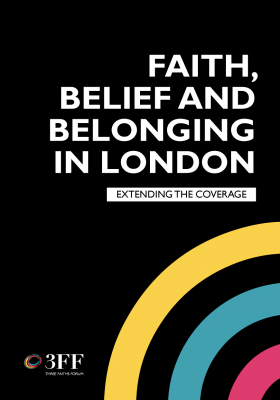 This briefing paper is the first in a series on how faith and belief relate to social exclusion and belonging in London.
This briefing paper is the first in a series on how faith and belief relate to social exclusion and belonging in London.
Our thanks to Her Majesty’s Lord-Lieutenant of Greater London’s Council on Faith, The Exilarch’s Foundation and the Department of Psychosocial Studies, Birkbeck, University of London, for their input and support which makes this series possible.
This paper accompanied our Evening of Faith Recognition and Celebration, which recognises the contribution of local projects to improving the lives of Londoners of all faiths and non-religious beliefs.
Throughout this paper, we mention projects which have received awards for their contribution to and for faith communities in London.
Download the full paper Download the text-only version
Encountering Faiths and Beliefs
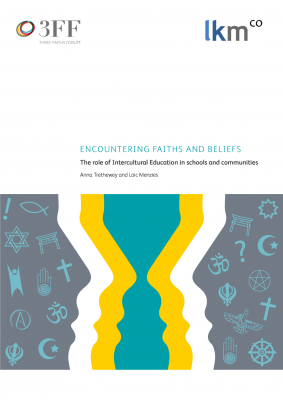 Drawing on the experience of educational experts working in schools across Britain, “Encountering Faiths and Beliefs” argues that pupils from different backgrounds need to interact with each other to build tolerance and understanding. It proposes several principles for good practice, including:
Drawing on the experience of educational experts working in schools across Britain, “Encountering Faiths and Beliefs” argues that pupils from different backgrounds need to interact with each other to build tolerance and understanding. It proposes several principles for good practice, including:
For more information about the role of Intercultural Education in schools, download our report Beyond RE: Engaging with Lived Diversity.